Aug. 25, 1930: Baer vs Campbell
At the end of the second, Frankie Campbell tells his corner, “Something feels like it broke in my head.”
He’d put future heavyweight champion Max Baer down in that round with a left to the ribs, though it was ruled a slip by referee Toby Irwin. Thinking Baer was taking a count, Campbell walked over to the ropes, turning his back on his opponent. Baer got to his feet, crossed the ring and landed a huge right to the side of Campbell’s head. Campbell stayed on his feet, but when he returned to his corner at the bell, he confided to his second, Tom “Greaseball” Maloney, that something wasn’t right.
The fight between Baer and Campbell took place outdoors, in a ring built over home plate at Recreation Park in San Francisco. The 21-year-old Baer, whose family had relocated to Northern California from Omaha, had gained recognition after knocking out Jack Linkhorn in front of a sellout crowd three months earlier.
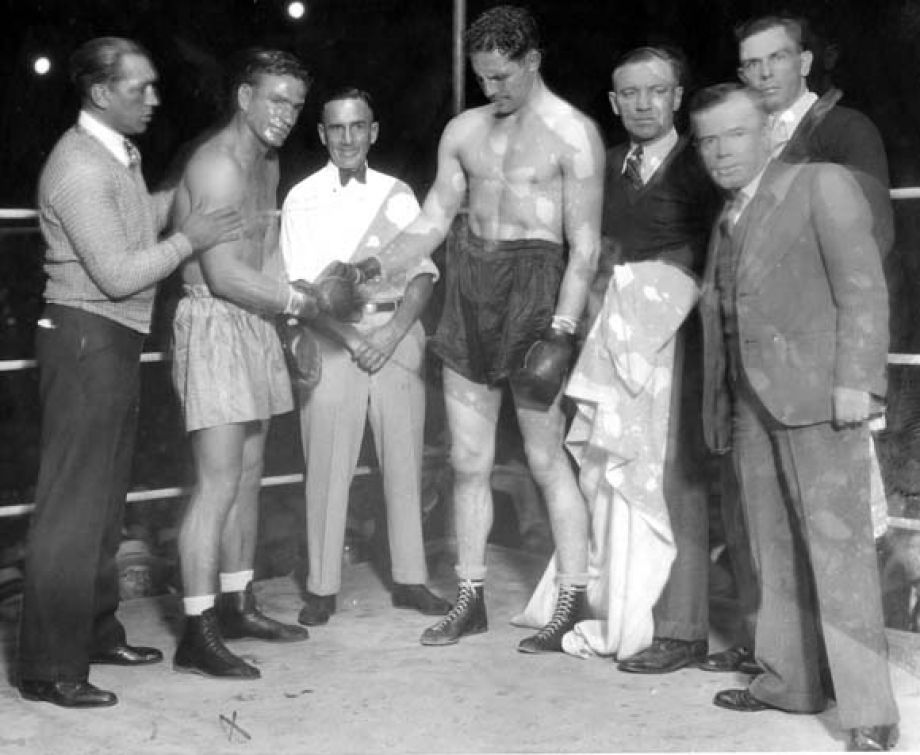
Frankie Campbell (born Francisco Camilli) was from San Francisco’s Glen Park neighbourhood, and was chosen as a suitable match-up for the younger Baer because he was a crowd pleaser, very busy in the ring. Also, as the other major California heavyweight talent, he was the logical opponent for something billed as the “Pacific Coast championship.” Despite Campbell’s riding a 14 bout win streak, Baer was the favourite and this was to be his last local fight before his handlers started shopping him out to the east coast promoters.
Baer came into the fight weighing 194, Campbell only 179. At the weigh-in, the State Athletic Commissioner instructed both men to “keep fighting as long as the other man is on his feet.”
After weathering the surprise shot from behind in the second, Campbell regains his momentum in the third round and takes the fourth handily. But in the fifth Campbell catches a left hook to the jaw which hangs him up in the corner. Baer pushes forward, launching a series of vicious power shots. Campbell, held up by the ropes, stays on his feet and Baer, relentless, stays on the attack, landing punch after punch, bouncing Campbell’s skull off the metal turnbuckle. When the referee finally pulls Baer away, Campbell topples to the floor, unconscious.
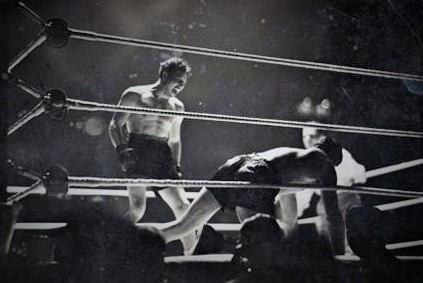
Baer leaves the ring, showers, changes into street clothes. He asks if he can see Campbell in his dressing room, find out how he’s doing. He’s told Campbell is still in the ring, has been lying there almost a half an hour, waiting for an ambulance to arrive. The next morning, Baer receives a call from the hospital. Campbell is dying. Baer makes his way there and is greeted by Campbell’s wife. They stand together by her husband’s bedside and she comforts the distraught Baer, saying “It could have been you.” She forgives him.
Frankie Campbell died at 11:35 am, of a double cerebral hemorrhage, the result of the blows received during the bout. Baer was taken into custody by Police Captain Fred Lemmon and charged with manslaughter, his bail set for $10 000. The charges were later dismissed, yet Max Baer, referee Toby Irwin, and the managers and seconds of both fighters were suspended for a year by the state athletic commission.

The death of Frankie Campbell traumatized Max Baer. He was a different fighter afterward, a different man. He lost much of his aggressiveness in the ring and became more of a showman, an entertainer. He took up smoking, and began having nightmares. Though Baer went on to take the heavyweight championship from Primo Carnera four years later, the events of August 25, 1930 obviously remained forever fresh in his mind.
“Nothing that ever happened to me—nothing that can happen to me—affected me like the death of Frankie Campbell,” he said, shortly after the fight with Carnera. “It was almost a week after the fight before I could get more than an hour or so of successive sleep. Every slightest detail would come racing back to mind, and I couldn’t blot from my eyes the last scene—Frankie unconscious in the ring, his handlers working on him. And then the news that he was dying … dead.” — David Como

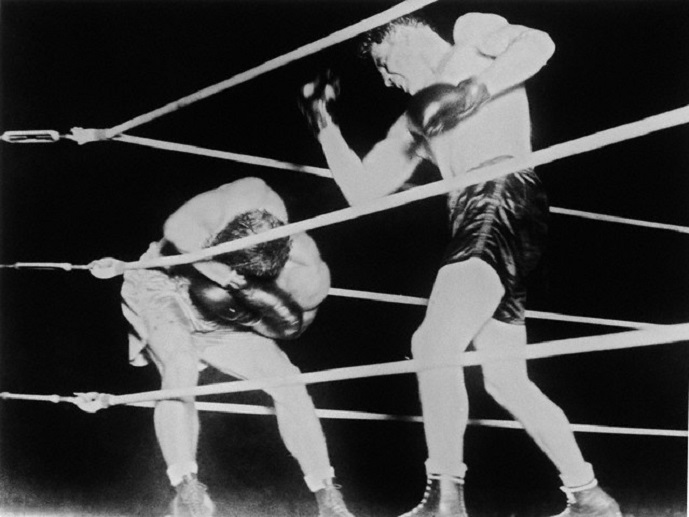

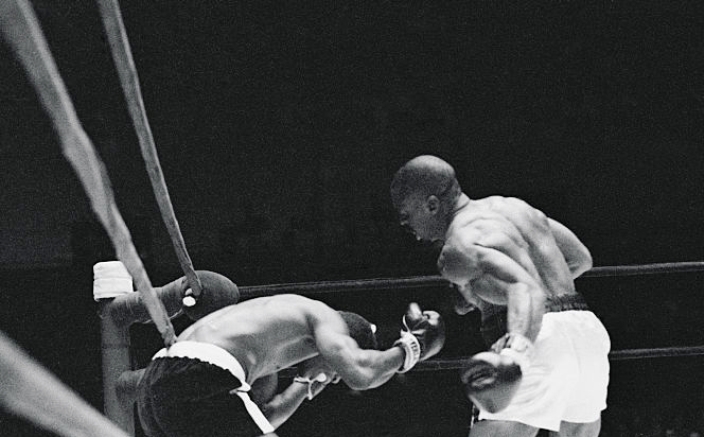
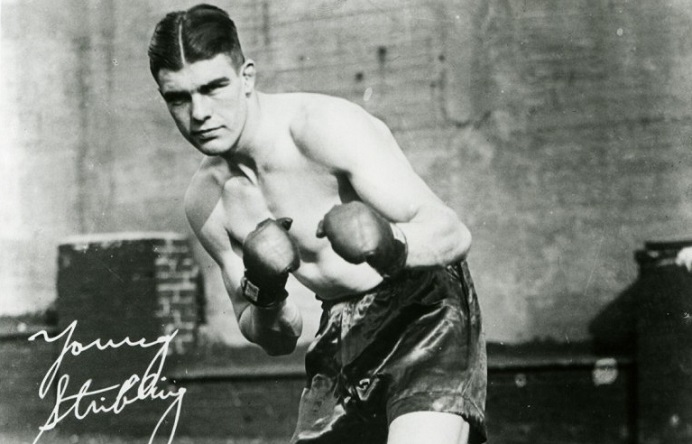

I feel so bad reading this.Ths really hurt me. Knowing a boxer died in the middle of the ring.
Campbell had a good record coming in, but all was lost because the tiny ref could not do his job. How Baer got out of this mess, along with Irwin and his sneaky getaway, make this tragic match and its legal handling a travesty of justice.
I agree with you 100% Steven.
Baer didn’t do anything wrong, he’s a fighter. But yes, the handlers and refs should have faced stiffer punishment.
I agree Ty 100%
But you’re Not supposed to hit an opponent from behind or from the side
It goes with the job. Very risky.
I agree.
It says that before the bout both boxers were told to keep fighting as long as the other man was still standing so I believe it to be mostly the referee at fault for not intervening and stopping the fight.
What about Campbell’s corner not stopping the fight? If he told his corner something broke in his head, the towel should have been thrown in.
The State Athletic Commissioner instructed both men to “keep fighting as long as the other man is on his feet.”
To charge Baer with manslaughter seems peculiar, unless they were outside the ring. But there was a referee, and regardless of his size, it should have been his responsibility to determine when the fight should have been stopped, but he was also under the State’s Athletic Commission’s stupid rule that the fighters should continue fighting as long as they are on their feet. That’s what Baer did, and ” yet Max Baer, referee Toby Irwin, and the managers and seconds of both fighters were suspended for a year by the state athletic commission. I would say the athletic commission should have been held responsible, instead of blaming (scapegoating) all concerned parties for doing what they instructed them to do – keep fighting as long as the boxers were on their feet. That’s a dangerous rule, and many boxers have died when they had too much heart to go down, and the referee didn’t intervene soon enough.
Wish the movie “Cinderella Man” had portrayed Baer as he actually was. This incident actually haunted him in real life but in the movie it was as if he was proud of it.
Cinderella Man is Ron Howards WORST FILM because it is UNTRUE. Max Bear was Devestated by Campbells death, plus several months later, Campbells wife had a mis-carriage. Fact is, Max Bear wanted to quit boxing and for a long time wanted nothing to do with boxing. Truth is, Max Bear wanted to get the Bradford fight over with. He was a very good man and far from the PRIX Ron Howard projected.
Yes, the movie approach to Baer is a simplistic one, and it’s untrue, of course. I guess that they were trying to reinforce the heroic description of Braddock by putting him on the ring against an evil villain, not the real Baer… Naive solution, in my view.
I remember myself feeling uncomfortable with Baer’s character, even before knowing the true story. It would have been much more interesting to tell the other side of the tale too, the Baer’s part.
Your so right, Ron Howard! Truth was not good enough for Oppie he had to jazz up an already incredible story. Hollywood bullshit again and again.
A family rumor is that my grandfather was one of the two boxes in the warm up fight before this one. He watched in person as this happened and said (indirectly to my father as he died long before I was born) that Max was visibly traumatized at the time. I’d love to find a list of the warm up fight(s) that happened before this main event to see if it is actually a true story.
What do you mean Cinderella Man? That was James Braddock?
Boxing was never more savage than the 20’s, 30’s and 1940’s. Corners and refs simply did not stop fights, ever.
If a man was out on his feet and unable to defend himself then he was going to be KO’d, and the people from that era were just fine with that, it was part of the game. Only after mounting deaths in the ring did refs begin to get more pro active in 40’s. Baer was truly haunted by Camilli’s death, dying of a heart attack at only 50 years old.